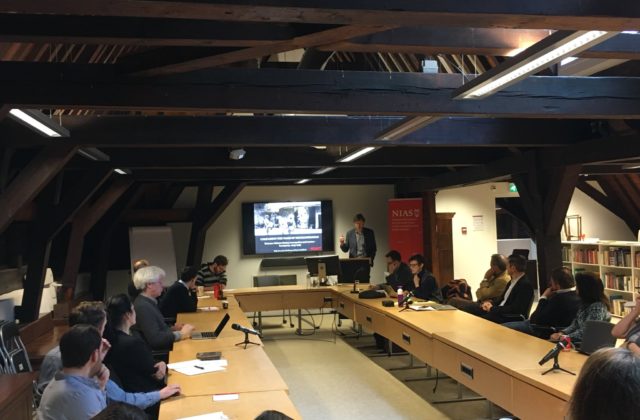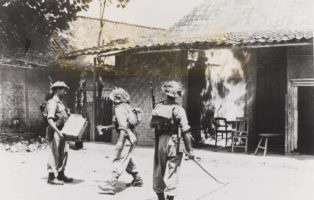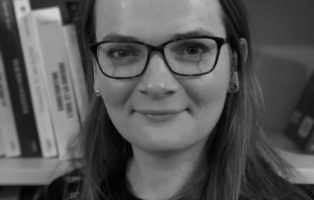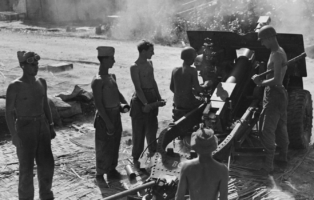Aim of the workshop
Decolonizing academic and popular history has been the topic of intense discussion in the Global North in recent years. To decolonize what we research, teach and put on public display “asks us to look at our shared assumptions about how the world is”,[1] and think about who we share those assumptions with, and why. What are the written and unwritten rules and norms we abide by when we decide what are valid and invalid research topics, questions and methodologies? In what ways does the relationship between location, identity and subject matter? How do funding and travel restrictions determine who researches what? Who chooses the indispensable works that cannot be missed off any curriculum? Who do museum artefacts belong to? What should contemporary European societies do with statues of men made famous through slavery, conquest and colonialism?
Decolonizing academia and popular history was not, of course, invented in the Global North. The Rhodes Must Fall movement began in South Africa in 2015 before moving to the universities of Oxford and Harvard. Long before this, in the mid-twentieth century, decolonizing history was an urgent concern for scholars in the recently independent countries of the Global South. The above questions are, however, now being asked with increasing insistence in European and North American universities, museums and wider society, not least because these discussions have become part of wider debates (and in some cases, locations for proxy wars) about what British, French, Belgian, Dutch, American (etc) politics, society and foreign policy are or should be in the twenty-first century. The political charge carried by these debates explains why the move to decolonize academic and popular history is sometimes presented in caricatured ways. For progressives, making the past more “inclusive” through an (often superficial) commitment to “diversity” can be presented as a “quick fix” to present-day societal problems. For conservatives, “decolonizing the curriculum” has been used as a byword for a “loss of national pride”, “self-flagellation” or “political correctness gone mad”. To decolonize academic and popular history is to do neither of these things. Rather, it is a call to think more critically and more globally about the structure and practice of our discipline, subject areas, methodologies and ethical frameworks.
This workshop takes places as the “Comparing the Wars of Decolonization” theme group’s time at NIAS comes to an end. This provides a vantage point from where we can engage with some of the critiques made of the larger research programme to which the theme group belongs, “Independence, Decolonization, Violence and War in Indonesia, 1945-1950”, and locate the issues raised within a broader system of knowledge production, which remains, in myriad ways, in need of decolonization. The workshop brings together academics working in institutions in the UK, France, Belgium and the Netherlands who have engaged in the question of decolonizing the academy, the curriculum and their research subjects from a range of different perspectives. The afternoon is organised in three thematic sessions, each starting with a brief 5-10 minute introductions to the theme by the invited speakers, with the aim of prompting discussion amongst participants, creating a space for debate and sharing ideas about how some of the key issues might begin to be addressed.
[1] Meera Sabaratnam, quoted in “What does ‘decolonize history’: mean?” https://www.historyextra.com/period/modern/decolonise-history-curriculum-education-how-meghan-markle-black-study/
Program
Lunch: 12:30-13:30 (for invited speakers)
Session 1: 13.30-14.30: Decolonising the curriculum
Chair: Fenneke Wekker, Head of Academic Affairs, NIAS
- Dr Meera Sabaratnam, School of Oriental and African Studies (SOAS), University of London. Author of Decolonising Intervention: International State-Building in Mozambique (2017) and Chair of the Decolonising SOAS Working Group
- Lilah Butler, student at Sciences Po, Paris, decolonising Wikipedia through an assessed assignment.
- What does it mean – and not mean – to decolonise the curriculum?
- How do we decolonise the curriculum?
- What happens when we decolonise the curriculum (including obstacles and deliberate misinterpretations, as well as the transformation of our understanding of knowledge)?
Session 2: 14.45-15.45: Decolonising the history of decolonisation
Chair: Dr Esther Captain, KITLV (Royal Netherlands Institute of Southeast Asian and Caribbean Studies), member of the “Comparing Wars of Decolonisation Project”
- Grace Leksana, Leiden University / KITLV (Royal Netherlands Institute of Southeast Asian and Caribbean Studies), PhD candidate, working on a PhD on the memory of violence in post-new order Indonesia.
- Hadi Purnama (TBC), VU University, PhD candidate, specialist in public international law.
- Dr Bart Luttikhuis, Leiden University / KITLV (Royal Netherlands Institute of Southeast Asian and Caribbean Studies) & Dr Natalya Vince, University of Portsmouth (both part of the “Comparing Wars of Decolonisation Project”)
- Two of the key historiographical trends in recent decades have been “global history” and “transnational history”. What do these mean, and who (really) gets to write the history of decolonisation? (Access to archives, visas, type, language and availability of publications)
- Who are the publics whom academics are seeking to engage with?
- What potential is there to write a history of decolonisation/recolonisation/wars of liberation which is genuinely multidirectional in its perspective?
Session 3: 16.00-17.00: “Diversity” and structural inequalities
Chair: Dr Ratna Saptari, Leiden University
- Dr Sophie Withaeckx, Vrije Universiteit Brussel, author of “Weakening the Institutional Wall, Reflections on Race, Gender and Decolonisation in the Belgian Academy”, Digest, 6:1 (2019), pp. 25-44.
- Dr Nedjib Sidi Moussa, author of La Fabrique du musulman [The creation of the Muslim] (2017) and Algérie: une autre histoire de l’indépendance [Algeria: another history of independence] (2019)
- “Diversity” is the watchword of the neo-liberal university: what does it mean, does it bring about gradual change or does it mask/ perpetuate structural inequalities?
- What support is provided to students considered to be from “non-traditional backgrounds”? What are some of the underlying assumptions in providing coaching, teaching growth mindsets, etc, to these students? What are some of the assumptions behind the term “non-traditional” about gender, class and race?
- What does a critical decolonial perspective look like and do? What is the potential and what are the obstacles for research and education to bring about more just societies? What are the very concrete things we can do now?
Registration
You can sign up for this program for free. If you subscribe for the program we count on your presence. If you are unable to attend, please let us know via tim.visser@nias.knaw.nl| T: +31 (0)20 2246723



